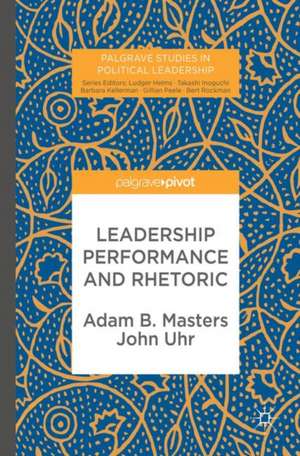Leadership Performance and Rhetoric: Palgrave Studies in Political Leadership
Autor Adam B. Masters, John Uhren Limba Engleză Hardback – 4 sep 2017
| Toate formatele și edițiile | Preț | Express |
|---|---|---|
| Paperback (1) | 349.93 lei 39-44 zile | |
| Springer International Publishing – 4 aug 2018 | 349.93 lei 39-44 zile | |
| Hardback (1) | 358.34 lei 39-44 zile | |
| Springer International Publishing – 4 sep 2017 | 358.34 lei 39-44 zile |
Din seria Palgrave Studies in Political Leadership
-
 Preț: 156.72 lei
Preț: 156.72 lei - 9%
 Preț: 754.86 lei
Preț: 754.86 lei - 20%
 Preț: 690.45 lei
Preț: 690.45 lei - 18%
 Preț: 885.49 lei
Preț: 885.49 lei -
 Preț: 325.96 lei
Preț: 325.96 lei - 15%
 Preț: 630.88 lei
Preț: 630.88 lei -
 Preț: 390.63 lei
Preț: 390.63 lei -
 Preț: 392.60 lei
Preț: 392.60 lei - 15%
 Preț: 647.40 lei
Preț: 647.40 lei -
 Preț: 384.86 lei
Preț: 384.86 lei -
 Preț: 388.72 lei
Preț: 388.72 lei -
 Preț: 390.63 lei
Preț: 390.63 lei - 15%
 Preț: 696.35 lei
Preț: 696.35 lei - 15%
 Preț: 586.70 lei
Preț: 586.70 lei - 18%
 Preț: 785.24 lei
Preț: 785.24 lei - 18%
 Preț: 1004.36 lei
Preț: 1004.36 lei - 18%
 Preț: 892.90 lei
Preț: 892.90 lei - 18%
 Preț: 786.98 lei
Preț: 786.98 lei -
 Preț: 451.87 lei
Preț: 451.87 lei - 9%
 Preț: 691.29 lei
Preț: 691.29 lei - 9%
 Preț: 791.83 lei
Preț: 791.83 lei - 18%
 Preț: 953.65 lei
Preț: 953.65 lei - 18%
 Preț: 734.44 lei
Preț: 734.44 lei -
 Preț: 391.22 lei
Preț: 391.22 lei
Preț: 358.34 lei
Nou
Puncte Express: 538
Preț estimativ în valută:
68.57€ • 71.79$ • 56.87£
68.57€ • 71.79$ • 56.87£
Carte tipărită la comandă
Livrare economică 07-12 aprilie
Preluare comenzi: 021 569.72.76
Specificații
ISBN-13: 9783319587738
ISBN-10: 3319587730
Pagini: 153
Ilustrații: XIII, 153 p. 4 illus.
Dimensiuni: 148 x 210 mm
Greutate: 0.32 kg
Ediția:1st ed. 2017
Editura: Springer International Publishing
Colecția Palgrave Macmillan
Seria Palgrave Studies in Political Leadership
Locul publicării:Cham, Switzerland
ISBN-10: 3319587730
Pagini: 153
Ilustrații: XIII, 153 p. 4 illus.
Dimensiuni: 148 x 210 mm
Greutate: 0.32 kg
Ediția:1st ed. 2017
Editura: Springer International Publishing
Colecția Palgrave Macmillan
Seria Palgrave Studies in Political Leadership
Locul publicării:Cham, Switzerland
Cuprins
Chapter 1 Leadership and Rhetoric.- Chapter 2 Selecting the Case Studies: Six Australian Public Leaders.- Chapter 3 Tony Abbott: An Opposition Leader Not Waiting For Political Office.- Chapter 4 Julia Gillard: Dealing With the Burden of Leadership.- Chapter 5 Bob Carr: Foreign Minister or Secretary of State?.- Chapter 6 Kevin Rudd: Rhetoric and a Royal Commission.- Chapter 7 Noel Pearson: Civil Leadership and Political Rhetoric.- Chapter 8 Malcolm Turnbull: From Hope to Disappointment.- Chapter 9 Conclusion.
Notă biografică
Adam B. Masters is Post-Doctoral Fellow at the Transnational Research Institute on Corruption at the Australian National University.
John Uhr is Director of the Centre for the Study of Australian Politics at the Australian National University.
John Uhr is Director of the Centre for the Study of Australian Politics at the Australian National University.
Textul de pe ultima copertă
‘Words are actions, and leaders know it. This thought-provoking study sheds light on the rhetorical battles that have shaped Australia’s recent political history – and it’s a cracking good read to boot.’ – Dr Dennis Grube, University of Cambridge, UK
This book examines both the rhetorical content of contemporary public leadership and the leadership methods pioneered by early English statesman Sir Francis Bacon. In particular, it considers the use of public rhetoric to defend leadership legitimacy in six case studies, drawing on leadership contests in recent Australian political history. The authors map out the complex language of leadership in contemporary politics through chapter-length portraits of the inter-related political rhetoric of prime ministers Rudd, Gillard, Abbott and Turnbull, plus former foreign minister Bob Carr and indigenous leader Noel Pearson. The process is a novel application of leadership analysis derived from the politicalphilosophy of Francis Bacon, who emerges as a founder of the study, and indeed practice, of political and public leadership. The book will appeal to students and scholars across the fields of political science, communication and rhetorical studies, and political history.
Caracteristici
Considers the complex use of language by public leaders to defend leadership legitimacy Compares and contrasts the public rhetoric of six Australian political leaders Uses Australian leaders as example to address international trends Includes supplementary material: sn.pub/extras
